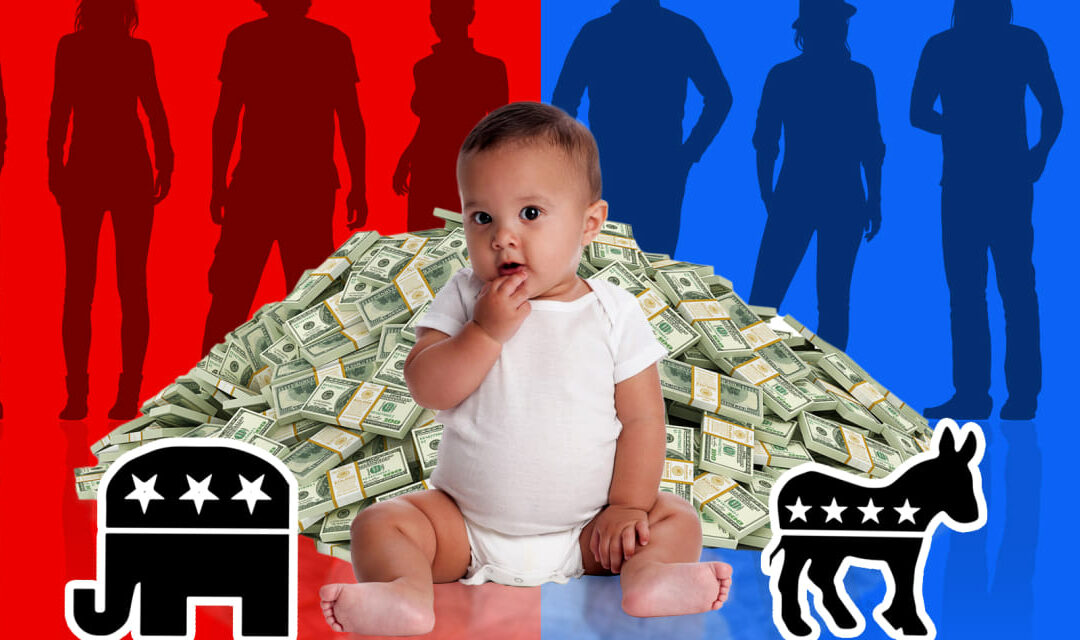Though they might have differing views on the economy, Republicans and Democrats have found one thing they can agree on: how difficult it is to cover the costs of raising kids.
Eighty-four percent of respondents agreed that “being a parent today is financially harder than ever before,” according to a recent survey published by Common Sense Media, a children’s-advocacy group. There was “intense” agreement on that statement even across party lines, the survey said.
“Likely voters, parents, teens, and kids alike do not think things are going very positively for American families,” the report said. “Across party identification, voters express these feelings of economic concern and pessimism.”
That widely shared negativity isn’t necessarily new. American consumers harbored stubbornly pessimistic views of the economy in 2023, mostly due to the lingering effects of high inflation.
The majority of parents from both parties seemed to indicate that those price increases are still having an impact. About 68% of parents raising children and teens said it’s difficult for them to afford the things they need to buy for their kids, and 57% think it’s getting worse.
What’s the best way to make things easier for parents? That’s where voters were split. Only a little more than a third strongly agreed that families need more economic assistance to get by in the early years of a child’s life, or when their kids are teens and young adults.
As for a paid leave program, 64% of Republicans supported the idea of 12-week paid family leave for all workers through a national fund, compared to 87% of Democrats.
The majority of voters also said they were “concerned” about the next generation’s economic opportunity.
About 34% of respondents said income not keeping up with expenses will be the biggest barrier to financial security when today’s children grow up. Others pointed to the cost of housing or the potential inability to get the education required for a good job.
When it came to their assessment of elected officials, responses were more split down party lines. Nearly half of Republicans said politicians are “not [doing] well at all” when it comes to “reflecting the needs desires, and experiences of younger people in this country,” the survey showed. Only 37% of Democrats shared that intensely critical view.
The soaring cost of raising children
Parents have faced their fair share of cost burdens over the last couple of years.
The price of childcare has outpaced inflation, and in many parts of the country, it’s nearly impossible to keep those costs below the 7% of yearly household income that the Department of Health and Human Services suggests.
Families will likely see those childcare options continue to shrink, said Julie Kashen, a senior fellow and director for women’s economic justice at The Century Foundation, a think tank that describes itself as nonpartisan and progressive.
In September, $24 billion in pandemic-era aid to the childcare sector expired. That has led some providers to raise their prices, shed staff or close their doors entirely, Kashen told MarketWatch.
“Parents are basically in a DIY situation when it comes to childcare, and there’s not even a Michaels to go to,” she said, referring to the arts and crafts retailer. “Providers who were finally able to make the math [of operating a childcare business] work are no longer able to do it.”
A November report from the Bank of America Institute found that spending by households that pay for childcare had lagged behind the rest of the population for several months.
Childcare isn’t the only cost that’s weighed heavier on families in recent years. The rising price of rent and groceries have placed an additional strain on household budgets, Kashen said.
Combine that with other stressors — like infant formula shortages or helping their children recover academically from remote schooling — and it’s no wonder families have felt stretched thin.
“It’s a scary time to be a parent,” she said.
But pandemic-era childcare programs — though their expirations have proved problematic — could potentially open the door for new forms of government assistance that helps families face these kinds of cost challenges, she said.
“The fact that we’ve had these initiatives over the past few years shows us what’s possible,” Kashen said. “That gives me hope.”
Check out On Watch by MarketWatch, a weekly podcast about the financial news we’re all watching — and how that’s affecting the economy and your wallet. MarketWatch’s Jeremy Owens trains his eye on what’s driving markets and offers insights that will help you make more informed money decisions. Subscribe on Spotify and Apple.









